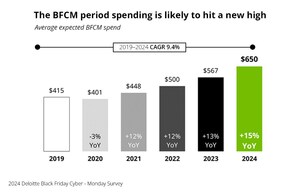Deloitte Report: 65 Percent of Life Sciences Company Professionals Use/Plan to Use Social Networking
Pending Regulatory Guidelines, Consumer Privacy Concerns and Unclear Return on Investment Present Adoption Hurdles
NEW YORK, Dec. 13, 2010 /PRNewswire/ -- As many life sciences companies begin to test the waters of online social networking, 65 percent of surveyed life sciences company professionals say their company uses or plans to use social networks at a company level in some capacity, while a surprising 35 percent report no plans to do so, according to a new Deloitte report titled, "To Friend or Not? New Insights About Social Networks in the Life Sciences Industry."
Survey respondents say undefined Food and Drug Administration (FDA) guidelines, consumer privacy concerns and a lack of a clearly demonstrated return on investment are the top three hurdles to widespread adoption.
"The abundance of regulatory and risk restrictions are causing some life sciences companies to cautiously and slowly explore online social networks," said Terry Hisey, vice chairman and life sciences sector leader, Deloitte LLP. "Innovative companies are beginning to leverage online social networks of physicians, patients and scientists to explore unprecedented opportunity to collect information, communicate important information and collaborate externally."
Despite the potential risks that could be associated with online social networking, half (50 percent) of surveyed respondents who report they are responsible for managing risk related to online social networks, say their companies do not have a formal risk policy in place and 43 percent do not have procedures for managing adverse events.
"While many are waiting for more comprehensive guidelines on social networking to be released by the FDA, the potential for risk is great in the world of social media," added Chris Franck, principal, Deloitte Consulting LLP, who serves Deloitte's life sciences and health care clients. "Implementing and clearly communicating formal procedures for engaging with customers and managing the risks of social networking are important factors for life sciences companies to address to protect brand integrity."
Future investment
Even after the FDA guidelines for social networking are issued, more than half (53 percent) of respondents still expect a significant amount of confusion around how life sciences companies can engage with social networks. Another 46 percent of respondents will continue to use social networks but won't increase investment until the FDA provides guidance. More than one-third of respondents (38 percent) are waiting for the FDA to issue guidance before making any investment. Nearly three in 10 respondents (28 percent), said their companies are waiting to see what ROI other companies get. However, the majority (73 percent) expect the budget allocated for social networking will increase over the next three years.
Additional findings from the report that surveyed marketing/brand management professionals include:
- Approximately 44 percent have an informal strategy for social networking that is not documented and/or fully supported by leadership, while 32 percent have no strategy at all.
- Survey respondents use social networking to disseminate information (51 percent), proactively seek information (42 percent), or to react or respond to pertinent information posted on an online social network (23 percent).
- One in five (20 percent) are indifferent to using social networking.
Hisey concluded, "Our survey findings demonstrate that the bulk of the use for social networking now is geared largely towards marketing. However, there are additional strategic applications beyond pure marketing still to evolve, such as conducting market research cheaper and faster; working with foundations to mobilize patients; improving peer-to-peer education through cost-effective medical education; determining the right patient reported outcomes; and providing data to help speed-up clinical trials. It will be interesting to see how the future of online social networking continues to evolve in the life sciences industry over the next five years."
Deloitte will host a webcast to discuss this report on Dec. 14, 2010 at 12:00 p.m. Eastern.
To attend the webcast, please register here:
Methodology
Executive interviews were conducted with life sciences company executives, Health 2.0 executives, and academics. To supplement qualitative findings, Deloitte surveyed 208 life sciences industry professionals who are involved in marketing and/or compliance and risk management to get attitudes and behaviors relating to social network use in the industry. Respondents from the pharmaceutical, biotechnology, medical device, and diagnostics industries were surveyed between June 22, 2010 and July 6, 2010 via a web-based questionnaire. Professionals with marketing and compliance and risk responsibilities were selected based on their company's core business and their day-to-day roles, and then asked to self describe their title and function. Respondents were categorized as "marketing" or "risk management" based on degree to which they were involved in brand management and risk and compliance in their day-to-day jobs. The web-based questionnaire consisted of 35 questions about the use and perceptions of social networks in their company and business units and was divided into a section focused to marketing professionals and a separate section focused to risk management professionals.
As used in this document, "Deloitte" means Deloitte LLP and its subsidiaries. Please see www.deloitte.com/us/about for a detailed description of the legal structure of Deloitte LLP and its subsidiaries.
Deloitte Social Networking Report
www.deloitte.com/us/lssocialnetworks
Terry Hisey www.deloitte.com/us/TerryHisey
Chris Franck www.deloitte.com/us/ChrisFranck
Contact: |
Marykate Reese |
Sean Leous |
|
Public Relations |
Public Relations |
||
Deloitte |
Hill & Knowlton |
||
+1 203 257 0452 |
+1 212 885 0549 |
||
SOURCE Deloitte
WANT YOUR COMPANY'S NEWS FEATURED ON PRNEWSWIRE.COM?
Newsrooms &
Influencers
Digital Media
Outlets
Journalists
Opted In






Share this article